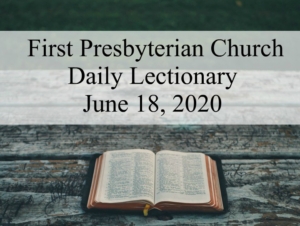
Gospel Reading Matthew 18:10-20
Romans 2:12-24
12All who have sinned apart from the law will also perish apart from the law, and all who have sinned under the law will be judged by the law. 13For it is not the hearers of the law who are righteous in God’s sight, but the doers of the law who will be justified. 14When Gentiles, who do not possess the law, do instinctively what the law requires, these, though not having the law, are a law to themselves. 15They show that what the law requires is written on their hearts, to which their own conscience also bears witness; and their conflicting thoughts will accuse or perhaps excuse them 16on the day when, according to my gospel, God, through Jesus Christ, will judge the secret thoughts of all.
17But if you call yourself a Jew and rely on the law and boast of your relation to God 18and know his will and determine what is best because you are instructed in the law, 19and if you are sure that you are a guide to the blind, a light to those who are in darkness, 20a corrector of the foolish, a teacher of children, having in the law the embodiment of knowledge and truth, 21you, then, that teach others, will you not teach yourself? While you preach against stealing, do you steal? 22You that forbid adultery, do you commit adultery? You that abhor idols, do you rob temples? 23You that boast in the law, do you dishonor God by breaking the law? 24For, as it is written, “The name of God is blasphemed among the Gentiles because of you.”
Hypocrisy may be the original sin of Christianity—because despite our pretensions to holiness, we so often fall short. This doesn’t excuse us from the obligation to try our best or do better (an important point from Romans, well worth mentioning). But when we’re tempted to think of ourselves as defined by our own goodness or righteousness or accomplishment—an easy habit to fall into for all of us—then we miss what’s most true about us: that we are made, loved, forgiven, and called by a God whose grace will not let us go. This theology is so old we hardly think about it anymore. Our Protestant ancestors reemphasized it some five hundred years ago. Maybe we think it’s quaint to have to even say it. Of course we know that everything we have comes as a gift from God! Where else would it come from? Then we spend our days working, counting accomplishments, collecting the pieces of our lives that we think will make us whole. Maybe their political pieces—another narrative to define who you are. Maybe they’re well-intentioned moves towards justice, as is much of the protest we see around the country. We start to get our ideas of ourselves from other places, and the definitional piece of our wholeness, our holiness, becomes lost in more fragments of the life we try to build for ourselves. Just remember: God still won’t let you go.
Gracious God, keep holding onto us, even in the times we let go of you, for the sake of Jesus Christ, your Son. Amen.

Get Social